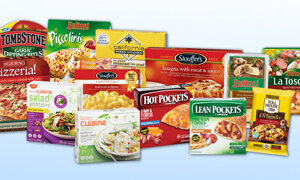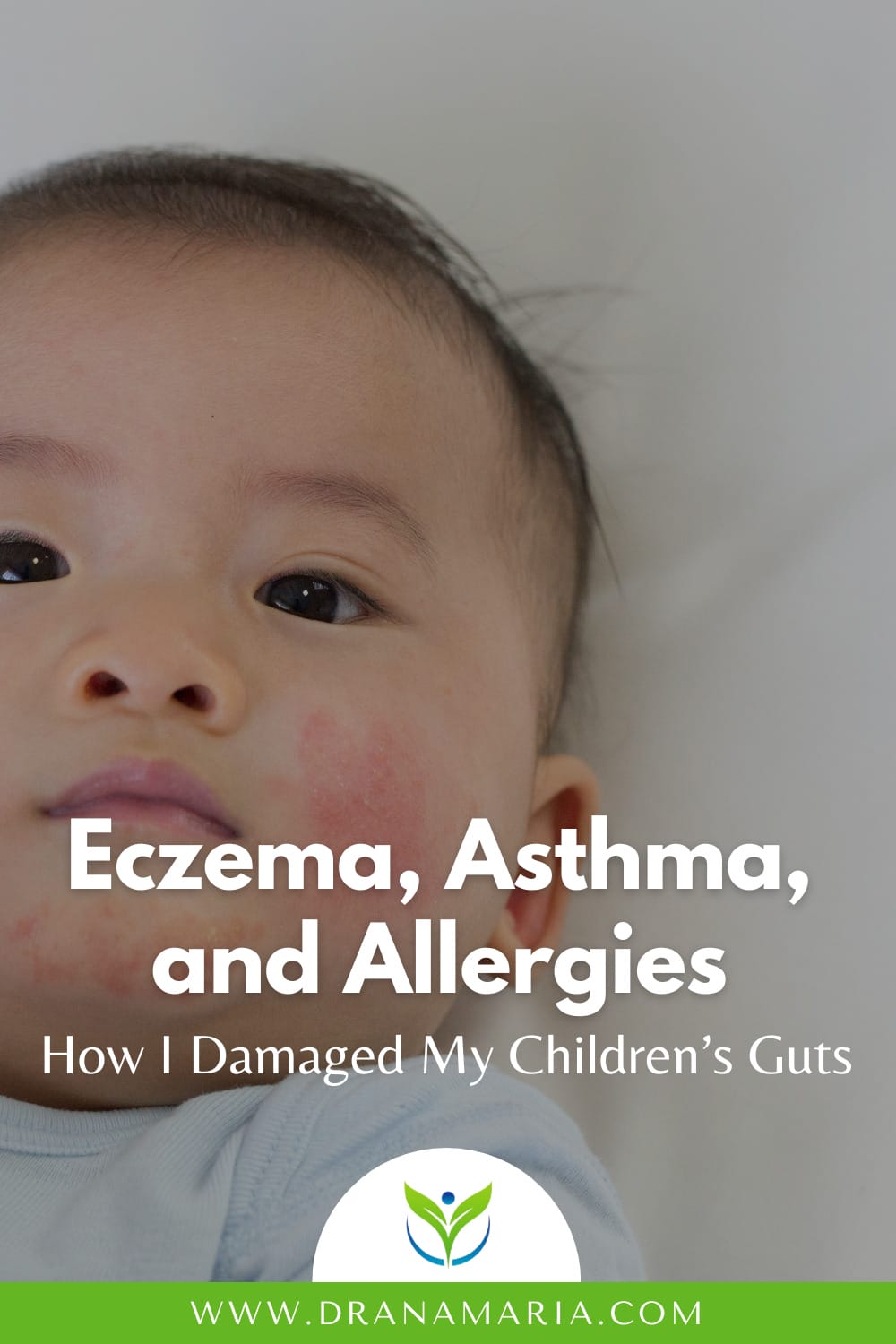In this blog, I invite you into the chapters of our family narrative, unraveling our background, health challenges, and the valuable lessons learned from the missteps we’ve encountered and overcome. Within these pages, you’ll discover the unintended actions that impacted my children’s guts and heightened their vulnerability to conditions such as eczema, asthma, and allergies. Join me as we explore the intricacies of our family journey, shining a spotlight on the profound link between eczema and the gut, and the pivotal role gut health plays in our collective story.
Social media has the unique ability to take life, which we know to be messy with lots of ups and downs/ failures and victories, and put a fake shiny gloss on it. Like putting lipstick on a pig! I think when people look at my Instagram posts or YouTube Channel, they probably miss the fact that my family struggled with our health for years. All 3 of my children experienced classic chronic inflammatory conditions such as eczema, allergies, and asthma, while my husband suffered from multiple inflammatory conditions in addition to anxiety. Heck, even my dog had severe allergies!
I struggled with an eating disorder as a young woman, chronic constipation with daily miralax use for 25 years, and more recently with multiple food allergies, and stress addiction. Did I mention my thyroid was toast? What do all of these ailments have in common? A sick or damaged gut. Why is gut health important? The gut microbiome promotes digestion and food absorption for energy production, performs a fundamental role in the function of the immune system, produces and communicates with hormonal products as an endocrine-like organ, and appears to have an impact on brain function. So here is our gut romance story.

They Meet
My husband and I met in 1995 during our first week of medical school at UNC Chapel Hill. As a Detroit native, my future husband was happily surprised when I walked into the first day of medical school wearing a Detroit Tigers baseball hat. Seeing an easy ice breaker to meet me, he walked up and said “It’s nice to see another Detroit Tigers fan in our class” to which I immediately replied, “Oh, it’s not mine, it’s my boyfriend’s hat”. Bam, rejection. Thankfully, he was persistent which led to our first date which I chose from the secret list of restaurants I wanted to try (and get someone else to pay for).
On our first date at a small italian restaurant on Franklin St in Chapel Hill, NC while sipping a beer my date immediately asked the waiter “What’s the largest portion plate you serve?” which made me chuckle. Then at the end of dinner when asked about desert I said “Of course I would like to see the desert menu” before my future husband could get the “No Thank You” out of his mouth. Hence our relationship was born as big eaters without much thought of the consequences.

Our second date was to my favorite chain restaurant at the time, The Macaroni Grill. I was appalled that John had never been there and felt he needed to experience the wonders of unlimited bread, olive oil, and a large jug of wine with a chalk board to keep track of your glasses by the honor system (a highly flawed business model given the more you drink the less diligent you are in tracking your glasses). I had no idea that each glass of wine, each slice of bread, and the huge plates of pasta packed with sugar were shaping our gut microbiomes.
By the end of our second date I was ready for John to finally kiss me – he had been strategically avoiding swapping spit with me for some reason. As we arrived at my apartment he gave me a warm embrace, and then went home. Bummer – not even a peck on the cheek! My friends were aghast. It became a daily question – “has he kissed you yet?” Little did I know that John had put a master plan in place. He figured that most guys were trying to get in my pants immediately, so he would do the opposite in the hopes that the Jedi mindtrick would peak my interest. It worked – I was smitten.
As many as 80 million bacteria are transferred during a 10 second kiss!
But maybe he also knew that each physical interaction between a couple allows a transfer of microbiota. You see, we each harbor nearly 1,000 different species of bacteria on our bodies, and those bacteria contain thousands of genes which help to expand the human genome. Each of us carry a different combination of bacteria giving us a unique microbiome fingerprint that is like no other. The difference here is that the fingerprint can change. And the person you cohabitate/get physical with can play a significant role in changing that fingerprint. So can a whole bunch of other things we will discuss later.
Do not disturb – microbiome swapping in session
So by date number 3, I was ready to swap some microbiome with this guy. And finally, as we made it to my door, he grabbed me and laid one on me. My most memorable kiss – and first major exchange of bacteria with John. So gross yet so romantic. You see, our microbiome is more than just our gut. We also have oral, nasopharyngeal, and skin microbiomes which all serve important functions for our immune system and overall health. But for the purposes of this blog, we will focus on the gut.
So we became an item. Spending every minute together, eating together, meeting the families, and generally figuring out how to be a couple. We tried to balance the poor diet and stress with exercise. On top of going to the student rec center for socializing and some weightlifting, I would drag a sleepy John along at 1am for late night jogs around Chapel Hill with a bat of my eyelashes. True story. The good news is that exercise modifies the gut microbiota with positive health effects – we of course did NOT know that at the time.

Poop in a bag
In fact, all we knew about our microbiome we learned in our med school microbiology class when they forced us to poop in a bag and bring it to class. So 200 medical students sheepishly walked into class carrying bags of their own poop which we then placed on culture dishes and grew in the lab. My husband commented, “For a diva like you, it must be pretty humbling to carry your poop around today!” Yep, pretty damn humbling. All I remember from that exercise was that we all harbor very different bacteria in our poop. The rest I have tried to wipe from my memory.
As my future husband and I were busy studying textbooks, learning how to examine patients, and swapping microbiomes, are diets continued to deteriorate. Our school and then residency demands multiplied, our stress dramatically increased, and our sleep suffered – additional factors which alter our bacteria. When we are stressed our bodies produce a stress hormone called cortisol. Cortisol and our microbiome have a complex relationship in that elevated cortisol levels can alter our microbiome, but more impressively changing our microbiome can elevate our cortisol levels and increase our stress!
And what about all those late nights studying, and then pulling those all-nighters in the hospital? Yep, they screwed up our microbiome as well. Our gut bacteria play a role in our circadian rhythm, and the negative bacteria that grow in response to sleep loss actually produce chemicals that make us more fatigued. And we haven’t even gotten to the garbage we were eating in the hospital – probably the biggest determinant of our gut bacteria health. It has always amazed me that institutions put in place to heal the sick and promote health, often times serve the least healthy food.
Suffice to say, by the time we were ready to have children, our microbiomes were a disaster.
Summary of Negative factors affecting mom and dad’s microbiome:
- Poor diet
- Stress
- Poor sleep
- Exposure to bleaches, hibiclens, and other industrial cleaners
- Lack of exercise
- Medications like antibiotics, zantac, laxatives (miralax), and SSRI’s
- Alcohol consumption
Ironically, we felt like we were some of the “healthiest” residents in our training program. So despite the fact that John “did not feel mentally ready”, my daily crying campaign won him over to the idea of making a baby. Of note, we were never taught that any of the above factors would result in disease or problems in our children. So between the all nighters at the hospital and John falling asleep whenever he sat still, it was baby making time!
I will spare the details and get to the life I was carefully constructing in my belly. All my numbers – perfect. Every check-up I heard, “you are doing great, keep it up”. No questions about sleep, stress, diet – amazingly, no one ever asked me “how would you rate the quality of your microbiome that you are about to pass to your baby?” Hmmm. But they did say, “no raw fish and no unpasteurized dairy” – gee, thanks. I did have an abnormal triple screen and so I had to have amniocentesis – but everything looked ok.
Time for a baby
Fast forward 9 months and one day I think I am peeing on myself. No large gush of water like you see on TV. I called the OB on call and told him about the “peeing” and he blew me off and said not to worry about it. The next morning I called again, telling them I was still “leaking” and they had me come in the office. Upon finding out my water had actually broken 24 hours prior, they rushed me over to the hospital. I called John and told him to meet me urgently at the hospital given the “you’re not peeing your water actually broke situation” I was dealing with. And, because there was now a significant risk of infection from having broke my water for so long, they pumped me full of antibiotics.
Although antibiotics were necessary in this case, let me vent about their general use and effect on your microbiome. Antibiotics are like Chernobyl to your happy beneficial bacteria, while also killing the bad guys. Don’t get me wrong – antibiotics have truly saved millions of lives, but their overuse is absolutely wreaking havoc on us. The CDC estimates that 30 percent of all antibiotics prescribed in outpatient clinics are unnecessary. Many overworked primary care doctors in our country know that it is much easier to write an antibiotic prescription to the frustrated mom with the screaming ear aching baby than to counsel her for 30 minutes on why antibiotics are not beneficial for ear infections.

This would also start at the top, with state and governmental recommendations on antibiotic dosing – but that opens up a whole can of worms. It doesn’t help that the medical system is in bed with the drug companies, and the profits of both entities are closely intertwined. Or that the hospital systems reward physicians for shorter visits and more patients seen, rather than better care.
Also, keep in mind that of all the antibiotics sold in the United States each year, 80% are used in the animal industry. Antibiotics used in raising animals likely plays a role in the microbiome of every person eating that Big Mac or Whopper. So if meat is your thing, make sure you are buying antibiotic free products to protect those delicate little buddies in your gut.
Next I am told that an emergent c-section is needed because the baby is in breach (butt first) position. They wheel me into the operative suite and quickly cut my belly open while my surgeon husband watches intently over the curtain. Upon pulling out my daughter, I was given another dose of antibiotics, and then proceeded to throw up all over the place. Lovely birth experience. Little did I know at the time all the implications of having a child via c-section.
Babies born via c-section never get to pass through the vaginal canal – given the sterile environment inside the womb, this is where they get their first exposure to a microbiome. A very important beneficial bacteria for babies, B. infantis, loves to live in airtight spaces like mom’s colon.
When giving birth, many mothers will also have an inadvertent bowel movement. And babies are typically born face down – so hopefully now you are getting the picture. It’s likely babies are meant to get some of mom’s poop in their mouths – yucky stuff right? But nowadays many moms will prep for delivery with an enema or bowel prep to decrease the possibility of a childbirth BM. But you may actually be hurting your baby by not allowing them the full poop immersion experience!! By the way, this is a great anecdote to tell your kids at dinner if they are refusing to eat their vegetables.
C-Section Mania
Despite the all the benefits of vaginal delivery, c-section rates continue to be unacceptably high. Prevention’s latest figures, 31.9 percent of all U.S. childbirths in 2016 were delivered via C-section. In 1991, C-sections only made up about 23.5 percent of births in the U.S. Working with 2009 data from 593 US hospitals nationwide, cesarean rates varied tenfold across hospitals, from 7.1 percent to 69.9 percent. Even for women with lower-risk pregnancies, in which more limited variation might be expected, cesarean rates varied fifteenfold, from 2.4 percent to 36.5 percent.
I had my new amazing bundle of joy, and fortunately, I was very focused on breastfeeding as my baby’s nutritional source. Of note, breastfeeding promotes the growth of a healthy microbiome and reduces rates of eczema, allergies, and asthma. Despite all those antibiotics at delivery, I got a wound infection anyway, which led to more antibiotics and my husband as a wound care nurse. Otherwise, life was pretty stable for the next wonderful 6 months I took off after the birth of my first child. Unfortunately, I did not carry on that tradition with my next 2.
When I became pregnant with my second child, I was immediately told by my obstetrician that I would be having another c-section since I had one the first time. I was taken aback – I didn’t want another c-section. I questioned the need for this and my OB begrudgingly said, “well you can consider vaginal birth after cesarian (VBAC) but there are risks, blah, blah, blah). Why not give me the info and help me make an informed decision? Answers seem to be
- 1. OB’s don’t want any risk (understandable)
- 2. Elective C-section is much more convenient for them and patients
- 3. C-section pays a hell of a lot more
Fast forward to the birth of my second child who simply wanted to stay tucked inside me forever – they finally had to suck him out (literally) at 3am in the morning after 18 hours of labor. My husband complains that that night was very hard on him given he couldn’t sleep well with all the noises I was making, he was hungry and the cafeteria was closed, and the gaming console on the TV wasn’t functioning correctly. Amazingly, my husband (and baby) made it through the night alive and healthy.
We attempted to adjust to life with 2 children and busy medical careers but struggled with time management and stress. We were also not aware back then that parental stress has a direct impact on children’s health. Studies have found that when parents are significantly stressed during their child’s first few years of life, some of the children’s genes – involved in insulin production and in brain development – were affected even years later, in adolescents. The brain changes that stress causes are not only hormonal, they can also be genetic – or “epigenetic,” which is a growing area of research. Epigenetics is the study of how genes can be turned on or off with certain environmental cues, stress being one of them.

My husband and I were both working 80-100 hours per week in high-stress situations; we were like ships passing in the night as we finished our shifts. Our diets were largely hospital food and poor quality processed foods that could be prepared in minutes – frozen pizzas, frozen burritos, mac’n cheese, fast food, and sugary cereal.
And then, our children started to get sick. My son, at only 6 months old, got the flu and was hospitalized for a week. We were sent home with a portable oxygen tank and he was on home oxygen for months. My daughter developed eczema which would flare up continuously causing with red, itchy, painful lesions. John kept getting “colds” and would still fall asleep anytime he sat down for more than 5 minutes. I had to take laxatives and sleep medicine daily to function. We were a mess.
We moved to Charlotte, NC in 2004 with hopes that our life would stabilize as we started new jobs as “real doctors”. So in typical American fashion, we bought a big house that we couldn’t afford and then had to work even harder to support our lifestyle. Then the allergies started in my kids – continuous buggers, green snot, red watery eyes, cough. I conveniently blamed North Carolina pollen as the culprit. We started Claritin and other antihistamines avoided going outside at pollen time, and waited for them to “grow out of it”.
Then the breathing problems started. My daughter would get short of breath when outside or in sports, so we started an inhaler. Then we had to get a nebulizer (they were already on steroids). Then we were told by my colleague that the next step was allergy injections. To top it off, John got pneumonia and was coughing up blood! What was going on?? I felt like a failure as a mother and as a doctor. And this is when the universe opened up to me.
I went to a lecture at my children’s preschool by a local nutritionist. Nutritional training in medical school is glaringly inadequate – they need to spend all the time making sure you know how to write for all the pills! At the lecture, the nutritionist only spoke about one thing: Sugar. It was my eureka moment. I immediately saw a connection to my family’s problems and our diet. At that point I had no idea that the real underlying issue was that we had incredibly sick guts and altered microbiomes – I just knew sugar was contributing to the problem.
I would ultimately find that many correctible things in our life were contributing to our sick guts and poor health, not just our diet. And thus my journey began to change my family. Once I realized I could change my family, I knew my life’s mission; to educate, inspire, and empower families to raise healthy kids in an unhealthy world. If you want the secrets to improving your family’s health, sign up for my newsletter here.

In Good Health,
Dr. Ana-Maria Temple
Was this helpful? Save for later!





